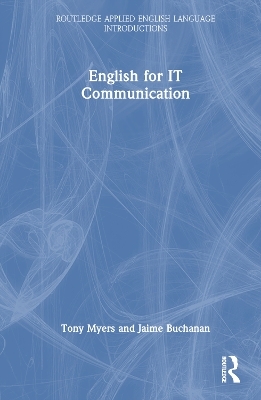
English for IT Communication
Routledge (Verlag)
978-1-032-64750-0 (ISBN)
- Lieferbar (Termin unbekannt)
- Versandkostenfrei
- Auch auf Rechnung
- Artikel merken
English for IT Communication provides a comprehensive introduction for students and professionals studying IT or computer science and covers all forms of technical communication from emails and memos through procedures to reports and design specs. In each case, the book offers multiple real-world examples, looking at who the texts are written for, what their purpose is, and how these affect what is on the page.
Key features of this book include
● How to write for different audiences and purposes
● How to design documents for ease of access and understanding
● How to communicate in multimodal media
● How to reference in IEEE
● Multiple different examples and breakdowns of common text types to show how they are written and to produce an understanding of quality in each
● Online support material including authentic examples of different workplace genres and a reference section covering relevant research studies and weblinks for readers to better understand the topics covered in each chapter
● Internationalized coverage of IT communication exemplars
This book is an accessible guide to writing effective forms of IT communications of the kind needed for all IT degree programs which aim to prepare students for the modern workplace. Practical and clearly written, it is designed to introduce readers to features of the most common genres in IT and computer science.
Tony Myers has worked for over 15 years in the tertiary sector helping learners develop skills in academic and technical writing. He is currently an assistant professor teaching at Zayed University, specializing in ESAP. He has previously written books on academic writing, psychoanalysis, and literature for Routledge and for Bloomsbury Academic, and has published articles on genre pedagogy, feedback literacy, and remote learning. Jaime Buchanan is a senior lecturer at Zayed University who has taught academic and technical writing in higher education since 2010. She has published articles on subjects as diverse as pedagogy, feedback literacy, and remote learning. She is passionate about developing an awareness of effective writing strategies in her students to promote best practice communication in IT.
Chapter 1 – Audienceand Purpose in IT
1.1 Introduction to audience and purpose
1.2 Analyzing audience: who’s going to read this?
1.3 Common types of IT audience
1.4 Analyzing purpose: why are they reading it?
1.5 Language for audience and purpose
1.6 Review
Chapter 2 – Design principles in IT
2.1 Introduction to design principles
2.2 Design principles
2.3 Design in IT contexts: headings
2.4 Design in IT contexts: lists
2.5 Data visualization strategies
2.6 Review
Chapter 3 – Workplace communication in IT
3.1 Introduction to workplace communication
3.2 Email
3.3 Memos
3.4 Enterprise social media
3.5 Language focus in workplace communications
3.6 Review
Chapter 4 – Process documents in SDLC
4.1 Introduction to project management documentation
4.2 Work breakdown structures
4.3 Roadmaps
4.4 Other process documents
4.5 SDLC documentation best practice
4.6 Review
Chapter 5 – System documents in SDLC
5.1 Introduction to product documentation
5.2 Product requirement document
5.3 Software requirements specification document
5.4 UX design documentation
5.5 API documentation
5.6 Quality assurance documentation
5.7 Language focus in system documentation
5.8 Review
Chapter 6 – User documents in SDLC
6.1 Introduction to user documentation
6.2 End-user documentation
6.3 Online tools
6.4 Language focus for user documents
6.5 System admin documentation
6.6 Review
Chapter 7 – Report writing in IT
7.1 Introduction to report writing in IT
7.2 Proposals
7.3 Recommendation reports
7.4 Feasibility reports
7.5 Progress reports
7.6 Evaluation reports
7.7 Common report features
7.8 Language focus in report writing
7.9 Review
Chapter 8 – IEEE referencing and formatting
8.1 Introduction to IEEE
8.2 The basics of referencing
8.3 In-text citations
8.4 End-reference list
8.5 Abbreviations and locators
8.6 IEEE style guide
8.7 Drafting tips for organizing source material
8.8. Review
Chapter 9 – Multimodal communication in IT
9.1 Introduction to multimodal communication
9.2 Video conferencing
9.3 Presentations
9.4 Language focus in presentations
9.5 Review
Chapter 10 – Case Studies: Applied communication in IT
Note to the teacher/independent learner
Case study 1: conduct a stakeholder profile
Case study 2: redesigning a company website
Case study 3: reviewing automated messages
Case study 4a: developing a micro-payments app
Case Study 4b: developing a micro-payments app
Case study 5: writing for end users
| Erscheinungsdatum | 23.10.2024 |
|---|---|
| Reihe/Serie | Routledge Applied English Language Introductions |
| Zusatzinfo | 77 Tables, black and white; 27 Line drawings, black and white; 27 Illustrations, black and white |
| Verlagsort | London |
| Sprache | englisch |
| Maße | 174 x 246 mm |
| Themenwelt | Schulbuch / Wörterbuch ► Wörterbuch / Fremdsprachen |
| Geisteswissenschaften ► Sprach- / Literaturwissenschaft ► Anglistik / Amerikanistik | |
| Geisteswissenschaften ► Sprach- / Literaturwissenschaft ► Literaturwissenschaft | |
| Geisteswissenschaften ► Sprach- / Literaturwissenschaft ► Sprachwissenschaft | |
| Mathematik / Informatik ► Informatik ► Theorie / Studium | |
| Sozialwissenschaften ► Kommunikation / Medien ► Kommunikationswissenschaft | |
| ISBN-10 | 1-032-64750-7 / 1032647507 |
| ISBN-13 | 978-1-032-64750-0 / 9781032647500 |
| Zustand | Neuware |
| Informationen gemäß Produktsicherheitsverordnung (GPSR) | |
| Haben Sie eine Frage zum Produkt? |
aus dem Bereich


